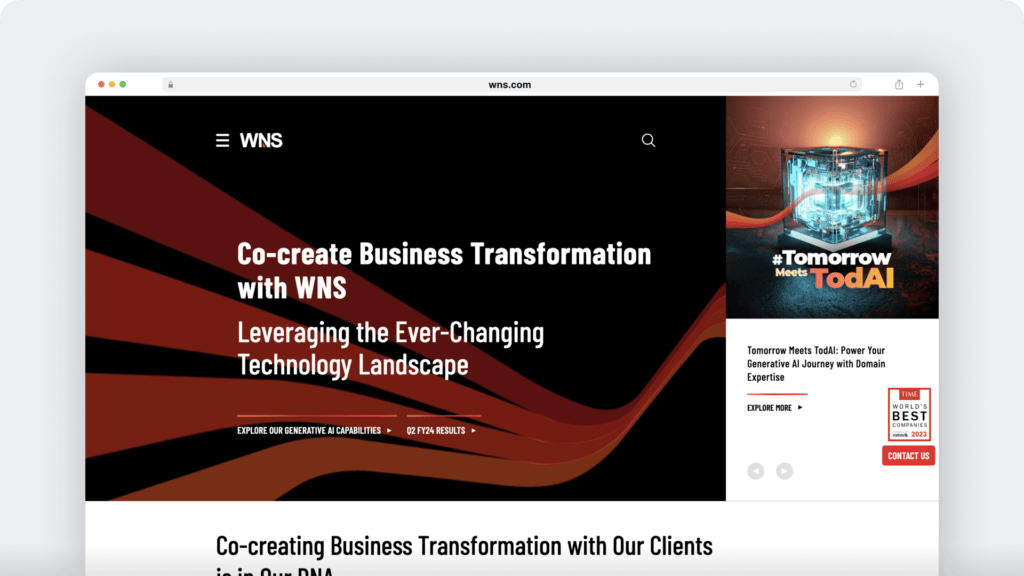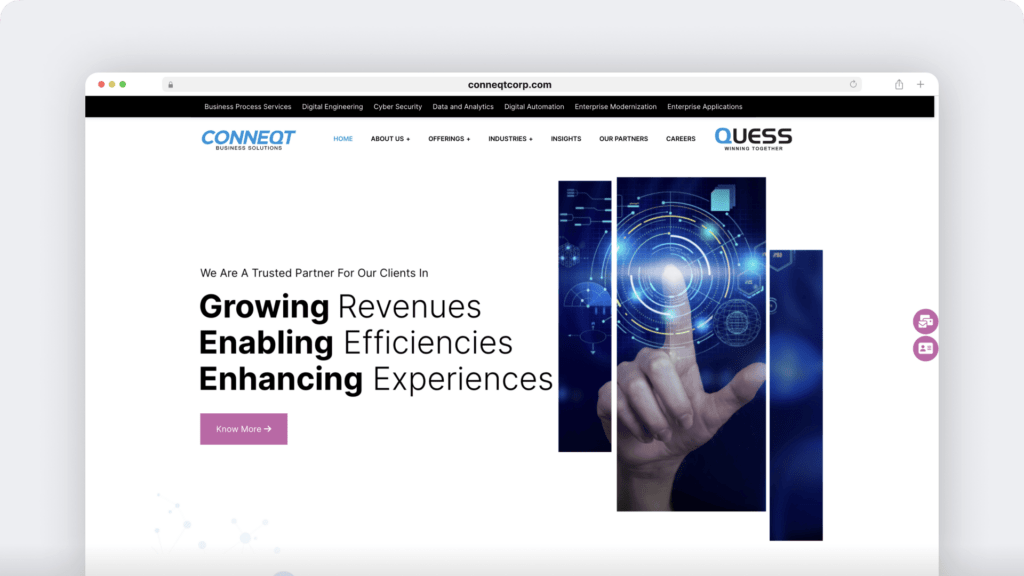A Knowledge Process Outsourcing (KPO) strategy can help you acquire expertise from a third-party vendor instead of hiring and training specialized professionals in-house.
The KPO industry in India offers services like data analytics, legal processes, IT services, etc., at affordable prices. This helps firms increase profitability, access specialized professionals, and develop quality end-products – making India the perfect KPO destination!
In this article, we’ll learn more about the Indian KPO industry’s advantages, cons, and popularly outsourced processes. We’ll also look into the five best KPO firms to help outsource your business functions to India.
Table of Contents
- An overview of the KPO industry in India
- 5 popular KPO services in India
- 5 key advantages of the KPO industry in India
- 3 disadvantages of the KPO industry in India
- 3 best KPO service providers in India
Let’s begin!
An overview of the KPO industry in India
KPO is a subset of Business Process Outsourcing (BPO). In the KPO model, firms outsource information-based business activities like data analytics and financial service to third-party vendors in countries like India, the Philippines, China, etc.
These processes need professionals with more technical knowledge like programming skills and software proficiency than in the BPO industry. Hiring such employees may be expensive in western countries like the USA, UK, etc.
But why has India emerged as one of the top KPO destinations in the world?
India has seen an impressive growth rate in the KPO industry in recent years, taking up nearly 70% of the global KPO market. The reason for such tremendous growth is mainly due to:
- Availability of highly qualified KPO professionals.
- Advanced software and technology.
- Sixth highest English language proficiency in Asia.
- Well-established KPO service providers and Information Technology Enabled Services (ITES) industries.
- Adoption of quality standards like ISO 9000 and Six Sigma.
- Multiple KPO business models.
And more.
What are these KPO business models?
The Indian KPO sector offers three knowledge process outsourcing models to suit specific client needs:
1. Captive business model
In a captive business model, a foreign company opens its centers in countries that offer operational efficiency with low costs and skilled professionals. These captive centers cater exclusively to the parent company’s needs.
Since establishing captive centers in foreign countries requires considerable investment, it’s usually followed by large organizations. Some companies with captive centers in India are McKinsey, Morgan Stanley, Goldman Sachs, etc.
2. Third-party service providers
Many small and large-scale firms operate as KPO service companies in India. If you don’t have the resources to start your own captive center, you can outsource your KPO processes to these third-party agencies.
Here’s how third-party service providers help you:
- They cater to multiple clients, which adds to their domain expertise and specialization.
- Most third-party agencies work on a project basis. So you can employ these agencies as and when your firm has outsourcing needs.
- Some third-party service companies tailor their services to meet clients’ requirements.
Popular third-party service providers in India are Aranca, Evalueserve, and WNS.
3. Virtual captives
A virtual captive center is a hybrid model that offers features of captive centers and third-party service providers.
Here, a KPO firm sets up a captive center on behalf of your parent company, enduring all infrastructural, labor, and technological costs. You’ll be able to fully manage the outsourced processes while the vendor maintains the venue for you.
Virtual captives are on the rise in India due to the benefits it offers, such as:
- Cost transparency.
- Foreign companies retain complete control.
- Effortless set-up.
- Low associated risks.
Still not convinced?
Let’s check out the top KPO services outsourced to India.
5 popular KPO services in India
According to Deloitte, India is the most preferred country for outsourcing services like finance, media, energy, etc.
But that’s not all!
Here are the top five KPO services in India:
1. Data analysis and management
To make better business decisions, it’s essential to transform important information on sales, customer satisfaction, market trends, etc., into actionable insights. But hiring analysts with apt domain knowledge in analytics, data management, etc., could be expensive in countries like the US.
For example, a data analyst’s average annual salary in India (USD 4,448) is low compared to the average annual salary in the UK (USD 78,643) and the US (USD 87,000).
That’s why western companies outsource data analysis-based processes to India. KPO companies in India offer skilled professionals with specialized knowledge and use advanced software like SPSS, SAS, etc., to meet client requirements.
2. Engineering services
Engineering Services Outsourcing (ESO) involves outsourcing engineering activities such as product design, production, maintenance, etc.
India has a popular engineering KPO sector due to the availability of skilled engineers, low wage rates, and ready-made infrastructure like offices, engineering software, etc.
You can also enjoy faster turnarounds by adopting a 24-hour development cycle, as you’ll have two teams in different time zones working on projects simultaneously. This will help you reduce the time your products take to reach markets.
Major industries that benefit from outsourcing engineering services to India include:
- Automobile industry.
- Aeronautical industry.
- Telecom industry.
- Industrial machinery manufacturing industry.
3. Financial service
You can outsource financial services like business model developments, company valuations, and analysis to India.
For example, Goldman Sachs established their captive center in Bangalore, which provides services like asset management, business research, equity operations, etc. Morgan Stanley has their own fixed income and equity research centers in India.
Outsourcing your firm’s financial service to India will help hire qualified KPO professionals like MBA graduates or Chartered Financial Analysts at minimal costs. As a result, you’ll be able to make good financial decisions, scale your company better, and offer quality services to your clients.
4. Legal services
Many legal process outsourcing firms hire dual-qualified Indian lawyers who are experts in American and European laws. This means that your outsourced legal team would be better qualified than your in-house team.
Legal research, litigation support, drafting contracts, etc., are some commonly outsourced legal processes. Here’s how outsourcing legal services to India can help your business:
- Ensures accuracy and faster results as most Indian legal process outsourcing firms use AI-powered legal management software to check contract legalities.
- Offers 24-hour availability and night shifts to help pick a shift suitable for your business and ensure that your legal needs are met on time.
- Focuses on your projects better than your in-house team as outsourcing firms work on a project basis, instead of handling multiple tasks simultaneously.
Moreover, if you outsource services like accounts, software development, data analysis, etc., to India, it makes more sense to outsource legal services too.
Indian legal teams may handle local employment laws, outsourcing contracts, etc., better than your in-house team as they’re better versed in the country’s laws.
5. Research and development (R&D)
Currently, India holds nearly one-third of the global R&D sector, contributing around USD 18.3 billion. This is primarily due to the:
- Access to a large sample size.
- Quick data analysis due to advanced technology and software.
- Massive skilled workforce.
Pharma, healthcare, marketing, and biotechnology sectors are some popular industries outsourcing their R&D processes to India.
For example, major companies like the Mckinsey Knowledge Center, have outsourced their research processes to India.
Next, let’s take a look at the benefits of outsourcing to India.
5 key advantages of the KPO industry in India
The Indian KPO sector is booming because of its several advantages, such as:
1. Large talent pool
Countries like the UK, the USA, Australia, etc., are facing a shortage of professional graduates in fields like R&D, healthcare, data analysis, etc. As a result, these countries have a small talent pool, leading to high labor costs.
Meanwhile, India has an impressive educational infrastructure that produces around 1.4 million graduates annually. So outsourcing KPO services to India will help you tap into an experienced, qualified, and trained workforce, helping you optimize your business process.
2. Cost efficiency
Typically, developing countries like India have a low cost of living, leading to low minimum wages.
Apart from a cost-effective workforce, outsourcing knowledge-based services let you increase profitability by cutting costs such as:
- Infrastructural costs.
- Technological and software investment.
- Specialized employee training.
For example, pharmaceutical companies like AstraZeneca have relocated their clinical trials to India. This strategy helps them accelerate the trial period with low production, infrastructural, and labor costs.
Check out the average salary in India to learn more about the salaries in the country.
3. Supportive government policies
The Indian government offers business-friendly policies and laws that help ease foreign companies’ entry into the country, creating a positive outsourcing experience.
Some governmental policies that help promote the KPO industry in India are:
- Patent protection for drugs and chemical products (Patent Amendment Rules, 2021).
- Establishment of software parks where companies enjoy customs duty exemptions.
- Special Economic Zones.
- Tax benefits like GST exemptions.
And more.
4. Data security
India offers several rules and regulations to legally protect your company’s data, such as:
A. IT Act, 2011
Under the IT Act, 2011, here are some rules Indian KPO companies should follow:
- Seek the client’s permission before sharing sensitive data like customer name, address, etc., with third parties.
- Receive written consent of concerned outsourcing firms before obtaining sensitive information from overseas companies.
- Ensure compliance with International Security Standard IS/ISO/IEC 27001.
B. National Cyber Security Policy, 2013
Here are some National Cyber Security Policy requirements:
- Designate a Chief Security Officer in firms to oversee cyber security.
- Develop legal frameworks that address sensitive areas in cloud computing, social media, and mobile computing.
- Address cyber security threats through National Critical Information Infrastructure Protection Centre (NCIIPC).
5. Round-the-clock availability
Outsourcing knowledge based services to India enables you to offer 24-hour service to your clients.
How?
You can leverage the time difference by adopting an around-the-clock operational strategy. This will help you finish your business processes earlier than in countries like the USA, UK, etc.
For example, an American company outsourcing automobile engineering to India can send their Indian team tasks at the end of their (US) work hours. The Indian team can work and submit results at the end of their local work hours – which would be the next work day in the US.
It’ll help you gain a competitive edge over your rivals through an uninterrupted workflow.
But the Indian KPO industry comes with a few drawbacks too. Let’s check out some of them to help you make an informed decision.
3 disadvantages of the KPO industry in India
Here are a few challenges you may face while outsourcing KPO services to India:
1. Communication barriers
India’s language and cultural differences from its European as well as American counterparts may affect communication, workflows, and service quality.
Indian KPO companies may find it difficult to understand the parent company’s work culture or specific colloquial terms. In such cases, it can be challenging for outsourcing companies and KPO firms to sort out issues and convey instructions.
You can solve these issues by ensuring proper communication channels where both parties can openly communicate. Additionally, you can conduct team meetings between in-house and outsourced teams to understand each other’s values as well as culture.
2. Lack of control over outsourced processes
Time zone differences and physical distances may make it challenging for you to check your outsourced team’s productivity. As a result, you may find it difficult to:
- Ensure similar quality standards as your parent company.
- Optimize your outsourced processes as employees may slack off work when unsupervised.
Don’t worry!
These issues can be easily solved by adopting appropriate measures that help monitor your team’s performance and maintain consistent work quality.
For example, a productivity tool like Time Doctor can help you monitor the performance of your KPO firm effortlessly. Such tools track your outsourced team’s work hours, generate comprehensive reports, and offer real-time updates on your team’s productivity.
3. Exchange rate fluctuations
Currency rate fluctuations may significantly impact your cost savings when outsourcing to foreign countries.
For example, if you’re a foreign firm based out of the UK, the USA, or Poland, an increase in the Indian Rupee’s value along with rising labor costs can reduce your outsourcing profit.
If you think these issues can be worked out, let’s check out a few top KPO companies that can help you with outsourcing.
3 best KPO service providers in India
Outsourcing works best when you partner with KPO providers that understand your company’s goals and quality metrics. Listed below are three KPO companies that can help you outsource to India.
1. Ugam

Ugam is an analytics and technology services company with its headquarters in Mumbai. It supports fields like market research, retail, healthcare, etc.
Key KPO services
- Cloud and data engineering
- Data visualization.
- Research design and programming.
2. WNS Global Service

WNS Global Service was founded by British Airways in Mumbai. Spread across 60 delivery centers worldwide, WNS Limited works across financial, life sciences, and travel industries.
Key KPO services
- Human resource management.
- Regulatory compliance and risk management.
- Data analytics.
3. Conneqt Corp

Conneqt Corp, based in Bangalore, is a digital transformation KPO provider. It aims to prepare firms for the digital age by using analytics, automation, and cognitive technology through its 21 delivery centers in India.
Key KPO services
- Digital finance services.
- B2B product support.
- Robotic process automation.
Wrapping up
A tremendous knowledge pool, increased scalability, and tailor-made services make India a popular KPO choice.
Although you may find some difficulty in performance monitoring, it’s nothing you can’t solve with a good outsourcing partner.
You can outsource processes like data management, legal services, R&D, etc., to hire highly-skilled experts the country offers.
So use this detailed guide to check if India ticks all boxes and is the right KPO destination for your business.

Liam Martin is a serial entrepreneur, co-founder of Time Doctor, Staff.com, and the Running Remote Conference, and author of the Wall Street Journal bestseller, “Running Remote.” He advocates for remote work and helps businesses optimize their remote teams.


